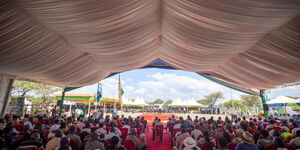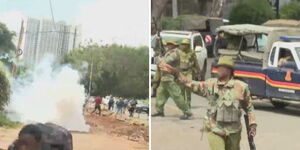After the success of the first cohort of the Kazi Mtaani Programme that saw some 26,000 youth secure employment, the government has expanded the initiative to cover all counties with 270,000 jobs up for grabs.
In a statement on Tuesday, June 30, a representative from the program noted that the state had set aside Ksh10 billion for the project.
So far, employment created from the initiative has significantly reduced crime in the areas it was rolled out as well as accorded the youth a chance to earn.
"Another key aspect was to ensure the economic side of it. We needed to create a situation whereby we give some young people money to take home.
"The Kazi Mtaani Programme has created more than we bargained for. Some of the things we were not focusing on was the reduction in crime. I have been made to understand that the level of crime has gone down with the fact that our youth are now engaged," he stated.
"We are happy to report that we are going to have Phase 2 and the government has set aside Ksh10 billion," he added.
In the first phase, the project was rolled out in eight counties including Nairobi, Mombasa, Kisumu, Nakuru, Kiambu, Kilifi, Kwale and Mandera.
"In phase one, we engaged about 26,000 youth, we want to multiply that 10 times and we are going to have 270,000 youths," he added.
How to land the job
Just like any other job, the Kazi Mtaani Initiative has its own set of requirements for applicants with its aim being to empower the youth financially so it goes without saying that applicants must fall into the Youth bracket.
The jobs are open for both skilled and unskilled individuals expected to:
- be aged between 18 and 35 years.
- be Kenyan citizens with valid identification cards
- possess a certificate of good conduct
- be residents of areas in which they make applications
Possessing a KCSE or KCPE certificate is an added bonus.
In the application process, personal details are required which include:
- Individual's name
- Identity Card number
- Telephone number
- Address
- The cluster name and village
To apply, interested parties will be required to present their applications to the assistant chiefs of the areas in which they reside.
The project falls under the National Hygiene Programme overseen by the Ministry of Interior.
Currently, enlisted workers from Nairobi, Kisumu, and Mombasa earn a daily wage of Kshs. 653.10 while workers from all other municipalities earn a daily wage of Kshs. 600.00 per day. The wages are guided by the Wage Order of 2018.
Payments are made once a week through mobile money transfer.
Specifics of the job
The youth are expected to work for a maximum of 8 hours from 8.00 am to 4.00 pm, Monday to Friday, every week with weekends and public holidays exempted.
In Phase 2, the enlisted youth will be expected to work for a maximum of 11 days per month.
The project will be expanded in phase 2 to include the upgrade of public sanitation facilities including building public toilets, and construction of projects.
The duties include:
- creating and paving walkways for people so that they are not walking on dusty paths and muddy areas, creating drainage within informal settlements
- creating community gardens within settlements;
- constructing green spaces and pocket parks where children can play, where land can be made available;
- repairing and refurbishing public offices, nursery schools, and community halls within informal settlements.
The Kazi Mtaani recruitment is done through a grass-root selection committee that identifies suitable workers. The selection committee is comprised of:
- Informal settlements leadership;
- Settlement Executive Committees (SECs), where they are operational;
- Nyumba Kumi leaders; and
- National Government Administration Officers (NGAOs).
Members of this committee are well versed with the localities and are known to the communities thus they are best placed to undertake this exercise.
{"preview_thumbnail":"/files/styles/video_embed_wysiwyg_preview/public/video_thumbnails/1AGYFPvYsZY.jpg?itok=2tnegPFf","video_url":"https://www.youtube.com/watch?v=1AGYFPvYsZY","settings":{"responsive":1,"width":"854","height":"480","autoplay":0},"settings_summary":["Embedded Video (Responsive)."]}












